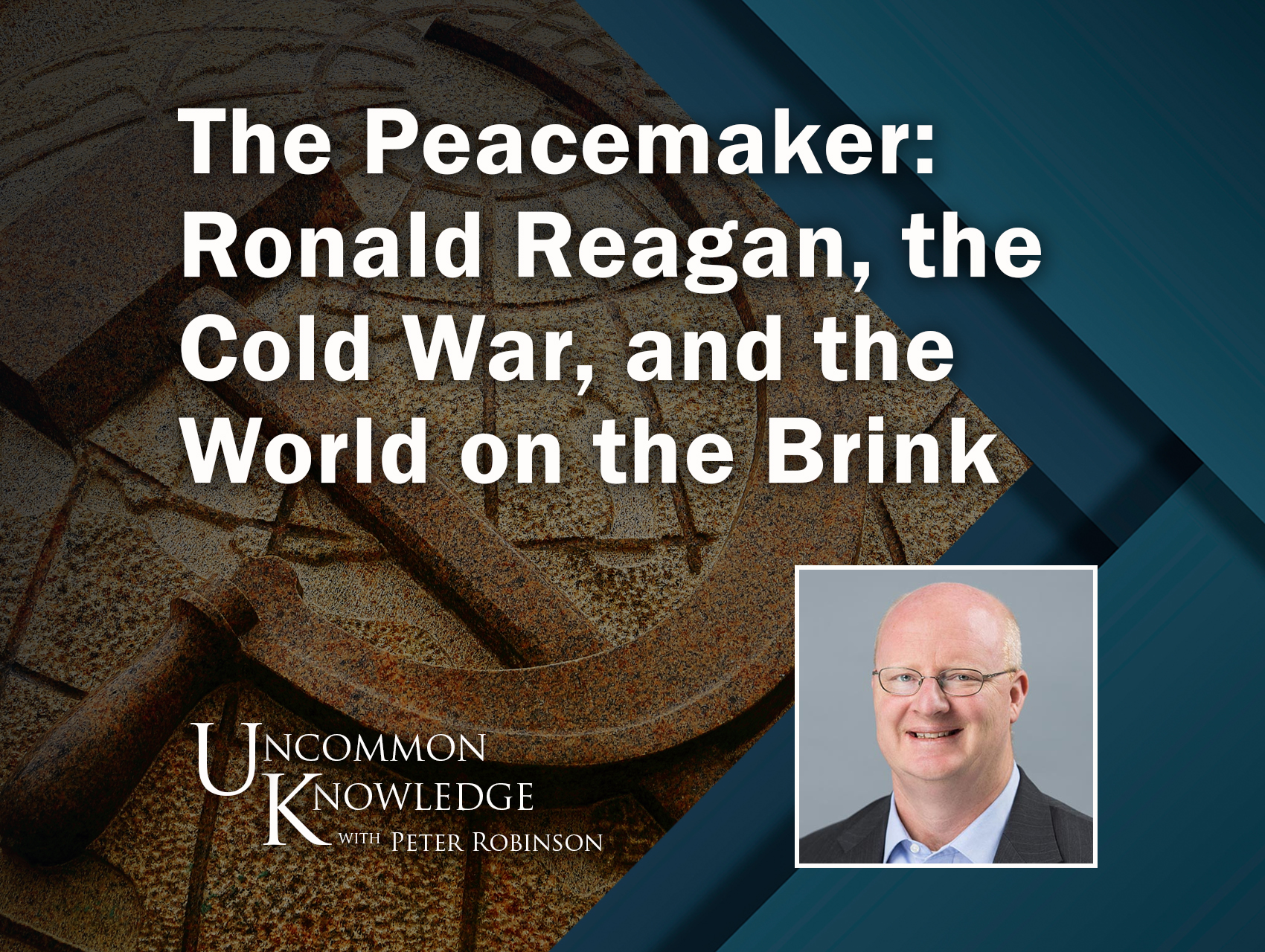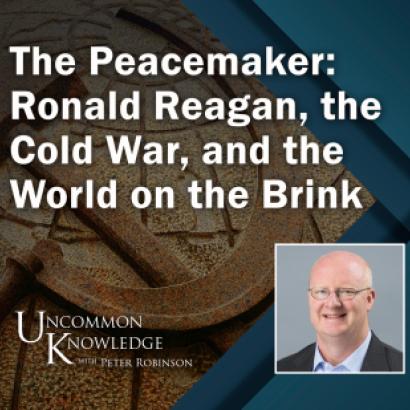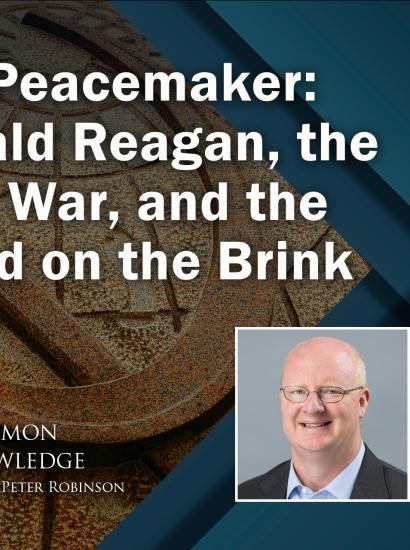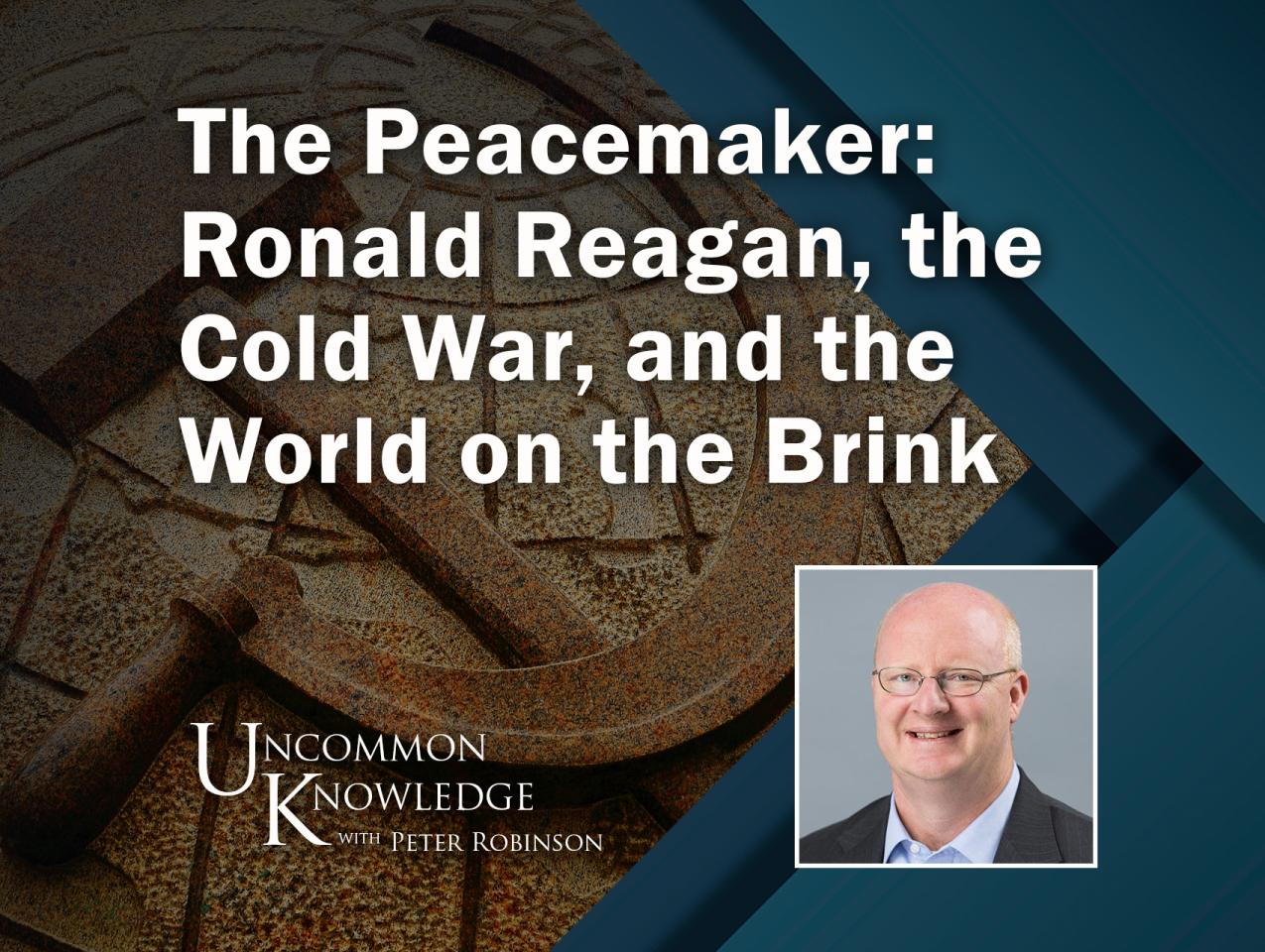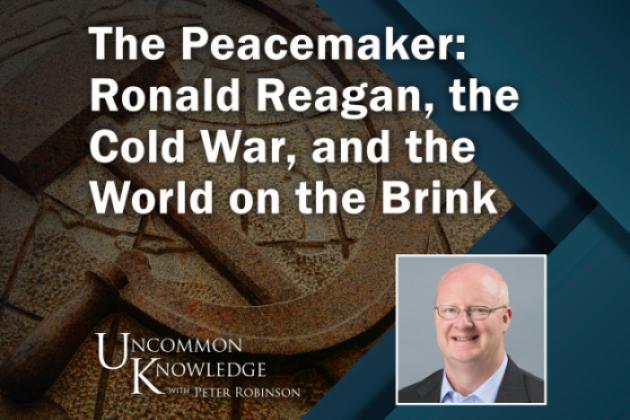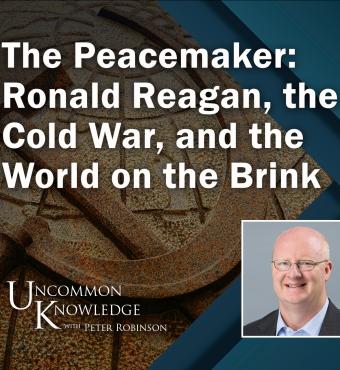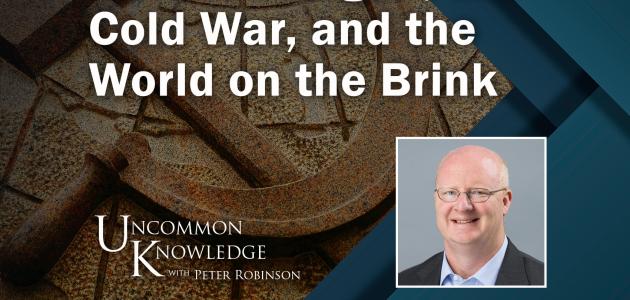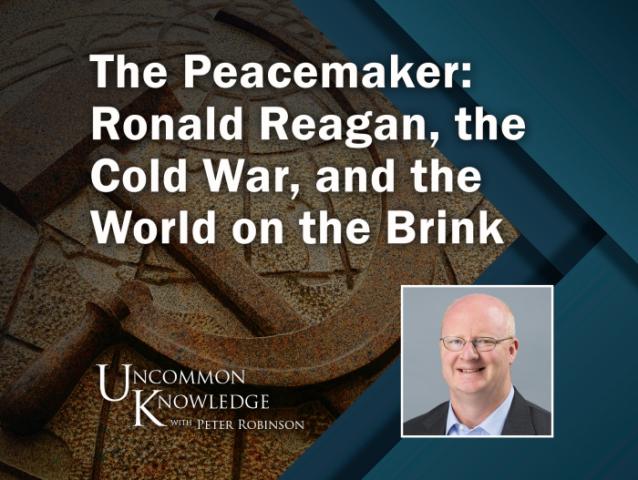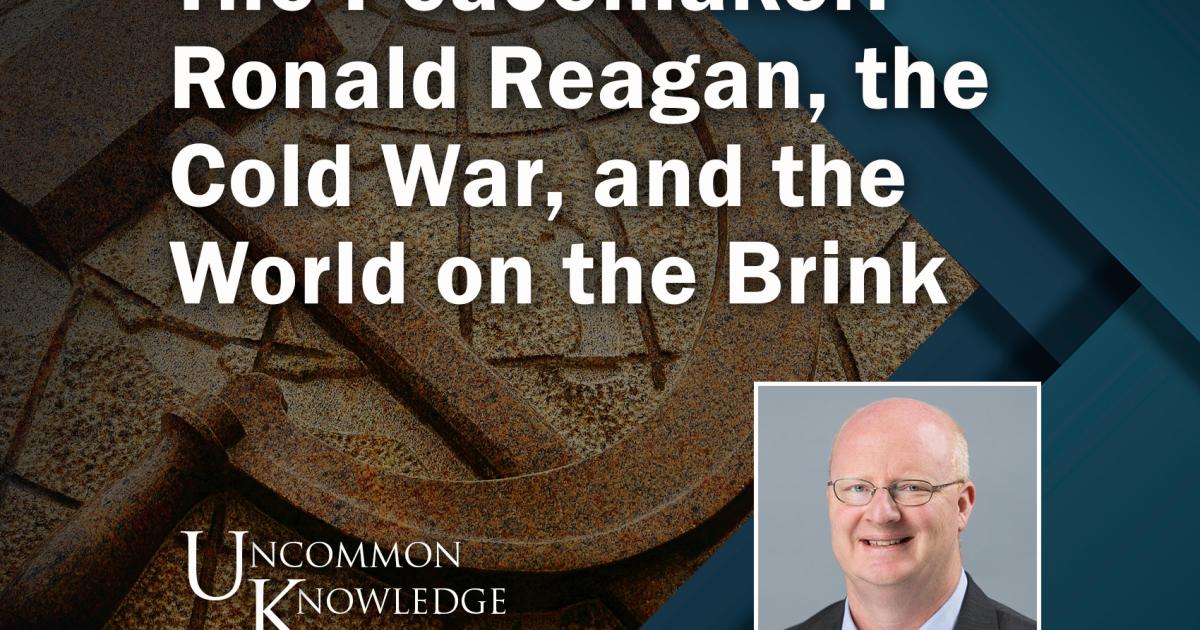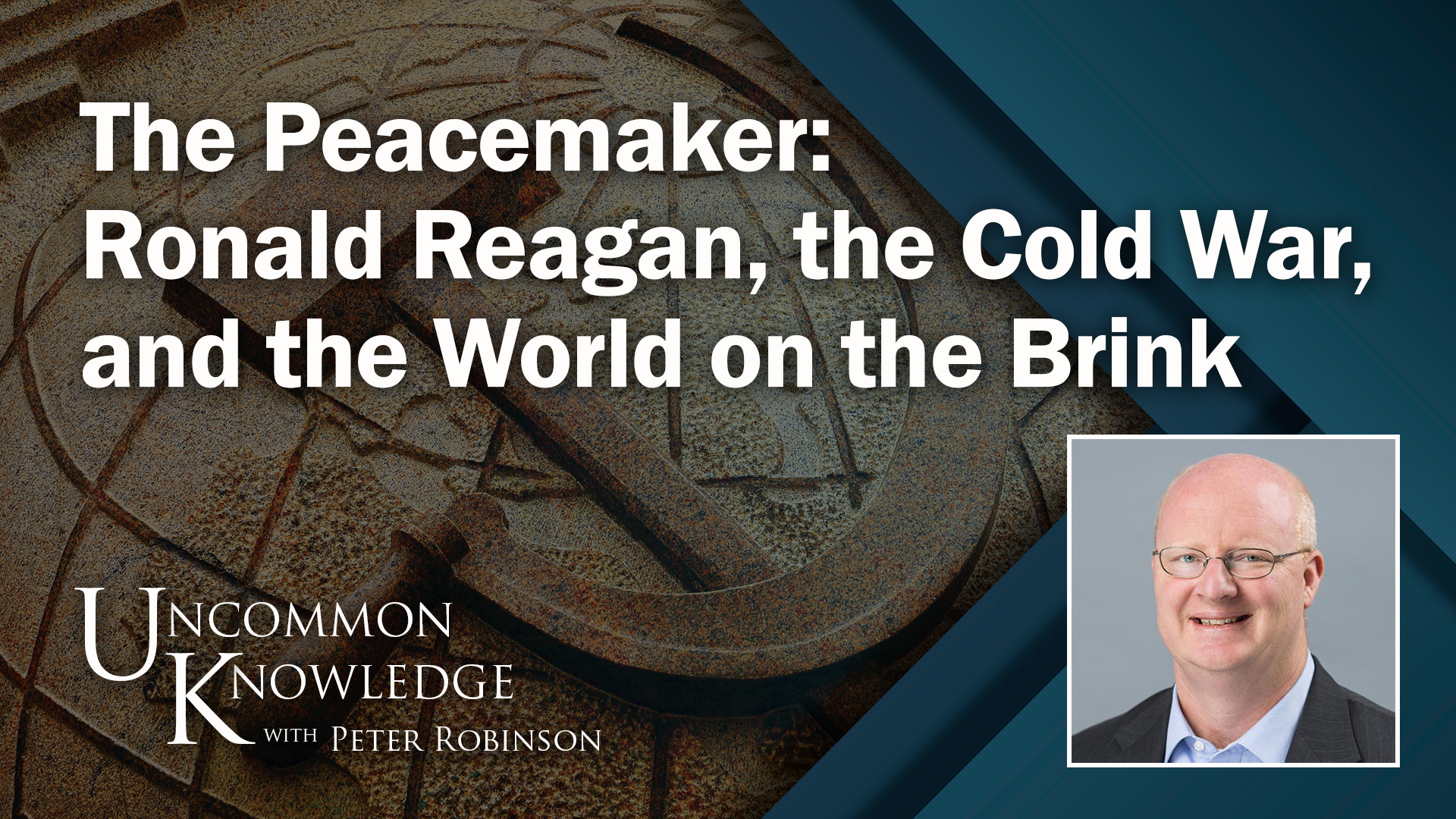- US
Will Inboden is a man of many talents: author, academic, and national policy maker. He held positions with the State Department and the National Security Council before returning to academia to serve as executive director of the Clements Center for National Security and associate professor of public policy and history at the LBJ School of Public Affairs, both at the University of Texas- Austin. In this wide-ranging two-part interview, Inboden discusses in detail Reagan’s strategy and tactics in bringing the Cold War to a successful and peaceful conclusion through negotiation and, yes, some artful bluffing. In this first installment, we cover Reagan’s first term in which he deals with the public’s perception of his intelligence, a large and popular antinuclear movement, and the execution of his “peace through strength” initiative.
To view the full transcript of this episode, read below:
Peter Robinson: During the 1980s, former Secretary of Defense Clark Clifford, expressed an opinion of President Ronald Reagan that remains current, in some quarters, even today. "Ronald Reagan," Clifford said, "was an amiable dunce". Now, a historian has published a new book about that dunce, "The Peacemaker: Ronald Reagan, the Cold War, "and the World on the Brink." Historian William Inboden on "Uncommon Knowledge" now. Welcome to Uncommon Knowledge, I'm Peter Robinson. A graduate of Stanford, William Inboden earned his Doctorate in History from Yale. Dr. Inboden worked for 15 years as a policymaker in Washington and overseas, holding positions with the State Department and the National Security Council, then returned to academia. He now serves as Executive Director of the Clements Center for National Security, and as an associate professor of Public Policy and History at the LBJ School of Public Affairs, both at the University of Texas in Austin. William Inboden's new book, his magnificent new book, "The Peacemaker: Ronald Reagan, the Cold War, "and the World on the Brink." Today, the first of two conversations with Dr Inboden, President Reagan's first term, or to use one of the chapter titles from this book, "The Battle is Joined." Will, welcome.
Will Inboden: Thank you, Peter, great to be with you.
Peter Robinson: What was at stake? Ronald Reagan announces his candidacy for president in 1979. Can you describe the correlation of forces, to use a good, old Marxist term, between the United States and the Soviet Union in 1979? And the background to this question and to our whole conversation, we're recording this on the Stanford campus, you work on the campus of the University of Texas in Austin, 18 and 19-year-old freshman walking around those campuses, as all campuses, were born after Ronald Reagan died. They have no memory of Reagan. The Cold War is a distant parents-and-grandparents memory. So, there's an act of imaginative recreation that you engage in here and that we need to do on this program right now to set up what was at stake. Alright, so the correlation of forces in 1979.
Will Inboden: Yes, so the bottom line, it looked like the Soviets were winning, and the United States was losing, the Cold War. The 1970s had been a dreadful decade for our country, for the free world, when Reagan announces his candidacy in November of 1979. At that point, it's six years after the United States had lost the first war in our history in Vietnam. Very divisive for our country, our troops had withdrawn in disgrace, at tremendous losses. And over the next six or seven years, if you just look at the advance of Communism around the world, it was enjoying tremendous successes on almost every continent: South Vietnam, Laos, Cambodia, in Africa, Mozambique, Ethiopia, Angola, in the Middle East, South Yemen, in Latin America, Nicaragua, Grenada. A few weeks after Reagan announces his campaign, the Soviets in invade Afghanistan. All of these countries had fallen to communism, none of it through open, free-and-fair elections. It is all Kremlin-sponsored, violent insurgencies. And so, it really looked across the globe as if the Soviet Bloc and its proxies were winning, and the United States and the free world were on our back heels. If you look at the military balance, somewhere between 1979, 1982, the Soviets hit the apex of their military power. They've got upwards of 40,000 nuclear warheads, almost all targeted at the United States. Their conventional forces are larger than ours, numerically, and also superior to many of ours, qualitatively. And then meanwhile, the United States not only is weaker in the military balance, but we are demoralized and divided at home. Our economy is a mess. The phenomenon of stagflation, high unemployment and high inflation, the OPEC oil embargo earlier in the decade had crippled our energy supplies, again, made us look weak and divided and almost impotent on the world stage. Our allies don't really trust us. They're starting to hedge and think maybe they need to cut some of their own side deals with the Soviets, 'cause you can't rely on, on the United States. So, President Reagan, when he announces his campaign, and then a year later when he is elected and then sworn into office, inherits a very weak hand and a very fraught, frankly, terrifying geopolitical situation.
Peter Robinson: Thank you. And then, in the way, in this country, the way we think about the relationship, something else that you point out, and again, I'll point out that you describe in some detail, and again, that we need to establish right at the beginning of the conversation, detente, coexistence. Here's Henry Kissinger's testifying to a congressional committee in 1974. "Detente," he writes, is, quote, "a process of managing relations with a potentially hostile country," close quote. I want to draw out two words there, managing relations. This is not a struggle in which one side is going to win and the other side is going to lose, although to anybody who's looking at the world scene, it does look as though we are losing. Still, the foreign policy establishment thinks in terms of managing relations with a potentially hostile power. We can't quite bring ourselves to admit that they're after us, that they're serious. Am I right about both of those?
Will Inboden: Yes, absolutely, and this is where just going back and appreciating that moment in history and just how radical, even revolutionary, Reagan's strategic vision was, is--
Peter Robinson: Let me quote that. As you describe, again, everything I'm about to say comes from your book, so let's stipulate that.
Will Inboden: Okay, so.
Peter Robinson: Ronald Reagan talking with an advisor in 1977, this is before he's announcing his candidacy, but he's thinking things through. "My theory of the Cold War is simple. "We win and they lose." Okay.
Will Inboden: Yes, so yes, and I love that statement, because on one level, the first time people hear it, it seems pithy, punchy, it plays well in the campaign trail. But embedded within it is a very complex, sophisticated, and, like I said, quite revolutionary set of strategic assumptions. And you had laid it out very well. So, in addition to the United States being on our back heels and losing the strategic balance in the Cold War through of the 1970s, a strategic consensus had emerged among most of the foreign policy expert class.
Peter Robinson: In both parties.
Will Inboden: In both parties, yes, exactly. So, Nixon and Ford, and, of course, Henry Kissinger on the Republican side, and then Jimmy Carter and his team largely embraced the same detent framework. And the presuppositions were just as you highlighted, there. No thought whatsoever that the Soviet Union could actually be defeated, rather an assumption that the Soviet Union is a permanent fixture on the geopolitical landscape. At that point, the Soviet Union had been around for, what, six decades since the Bolshevik Revolution, and most expert opinion was they'll be with us at least another six decades, if not another century, if not into perpetuity. And so--
Peter Robinson: By the way,
Will Inboden: Yeah.
Peter Robinson: This seems foolish to us now, but it didn't seem foolish. Henry Kissinger, hugely accomplished writer.
Will Inboden: Oh, yes. Brilliant man.
Peter Robinson: These were highly-intelligent people who had meditated long and hard on world history, and that's the way it looked to them.
Will Inboden: Yeah, they didn't perceive the Soviet Union's, economic fragility or political illegitimacy. They knew that it's not the most dynamic, thriving economy in the world. They said, look, they've been able to get along thus far, and all the signs are they'll continue to do so.
Peter Robinson: So, Reagan is elected in November, 1980. defeating incumbent president Jimmy Carter by 10 points. We, who have lived many years now in close elections, need to be reminded that it wasn't close. He wins by 10 points, and Reagan carries 44 of 50 states. This peacemaker, so this man comes into office, the United States is losing, in a certain sense, certainly on the defensive. We have the foreign policy establishment in both parties, thinking that, at best, we can manage this relationship for decades to come. The Peacemaker, "Reagan held clear end goals: "the expansion of liberty in the world, "the end of Soviet communism, the abolition "of nuclear weapons, peace between the American "and Russian people, and a world free of the Cold War. "How did all those pieces fit together? "Reagan would resolve the puzzle "by pursuing the Soviet Union's negotiated surrender." Negotiated surrender, explain that term.
Will Inboden: Sure, and this goes back to his earlier reframing of the Cold War as an a contest that he thinks the United States can actually win and we can defeat the Soviets. So, a couple important principles. Every previous Cold War president, especially Nixon, Ford, and Carter, again, as we talked about, had seen Soviet communism as a challenge to be managed or contained. And Reagan reverses that, he sees the Cold War as a battle of ideas, and he sees Soviet communism as a vile idea to be defeated, rather than a geopolitical rival to be managed. So, he's not dismissive of the geopolitical dimensions of this, but for him, it's primarily this battle of ideas. And so, that's why he wants to see the collapse of Soviet communism, the end of that system, and its surrender. However, he's also very committed to keeping the Cold War cold, by which we mean avoiding the destruction of the world in a nuclear apocalypse. And so, that's why, from the outset of his presidency, he's also committed to pursuing negotiations with the Soviet system. He just wants those negotiations to be on terms favorable to the United States and reducing the threat of nuclear war, reducing the nuclear arsenals of both sides, but all while still pushing the Soviet system itself to collapse. And of course, there's some internal tensions and contradictions in there. But that is the art of statecraft, right? And keeping two different goals in, in some balance. And I think Reagan devises the strategy for that and he has to adapt at times, of course, but overall manages it masterfully. All right, June 8th, 1982, Ronald Reagan delivers an address before the British Parliament. 1982 is, in some ways, early in the administration, because his first year goes to personnel shuffling, Al Haig gets kicked out of Secretary of State, replaced by George Schultz, and of course, Ronald Reagan survives an assassination attempt, and survives it very narrowly, as we now know. Alright, so there's a certain sense in which the first year is, not chaotic, but you don't have the feeling that they're in harness quite yet. Now, we do. June 8th, 1982, Ronald Reagan before the British Parliament.
Ronald Reagan clip: In an ironic sense, Carl Marx was right. We are witnessing today a great revolutionary crisis, a crisis where the demands of the economic order are conflicting directly with those of the political order. But the crisis is happening not in the free, non-Marxist West, but in the home of Marxist Leninism, the Soviet Union. What I'm describing now is a plan and a hope for the longterm, the march of freedom and democracy, which will leave Marxism-Leninism on the ash heap of history, as it has left other tyrannies which stifle the freedom and muzzle the self-expression of the people.
Peter Robinson: You described that speech in your book as the greatest speech of Reagan's presidency.
Will Inboden: Mmhmm, very close followed, of course, by tear down this wall, but we'll talk about that another time.
Peter Robinson: We'll come to that.
Peter Robinson: But so, you also go into the response to the speech. Again, I'm quoting all this from "The Peacemaker." "A column in the Guardian "disdained the speech as 'unmemorable.' "NBC News anchor Tom Brokaw "dismissed the speech as 'naive.'" Tom Brokaw substituting his judgment of world affairs for that of Ronald Reagan. "A New York Times editorial complained that," quote, "'characteristically, Reagan failed to give the Russians "'a plausible range of policy choices.'" And you continue, "Even some conservatives piled on." "Columnist Robert Novak lacerated "the policies in the speech as," quote, "'in some ways softer than Jimmy Carter,'" close quote. Ronald Reagan lays out the strategy, he spots the economic weakness of the Soviet Union, he advances a strategy, of course, we didn't have time to go into the whole speech, that is going to confront the Soviets on the level of ideas. He takes Trotsky's famous lying about Communism leaving capitalism on the ash heap of history, and turns it around and says, no, it's freedom that will leave communism on the ash heap of history. He does all of this, and everybody misses it.
Will Inboden: Yes, yes.
Peter Robinson: Why?
Will Inboden: Yes, so I think it's a great example of how group think can take over among expert opinion, whether it's foreign policy experts, or journalists, or think-tankers, and all of us are susceptible to this, we can now see it in the hindsight of history, how wrong they were, but all of those people that who criticized his speech, they had embraced this common paradigm of the Cold War as this static standoff that had been with us for decades, was gonna continue to be with us for decades and just see the Soviet Union as a stable and permanent system that is not going away and is part of the geopolitical landscape. And so, for President Reagan to come in and reframe the Cold War as this battle of ideas, that's the first radical step. And then, to proclaim that the ideas of the free world, democracy, free markets, religious liberty, pluralism, self-determination, self-government, all these pillars of the free world, certainly the American system, that these are superior and that these will win, and to point out not just the inefficiencies, but the falsehoods at the core of Marxist-Leninist ideology, is just radical, and it is so upsetting to so much of the conventional wisdom. But it also shows how he really took the ideas of his adversaries seriously, and as you rightly pointed out, he just wants to turn it against them. So, Marxism-Leninism is based on, without getting too much into the weeds on the historical dialectic the belief that there is an inevitable instrument in history pointing inexorably to the final victory of Marxism-Leninism, and leaving capitalism on it's ash heap. And Reagan turn turns that around and says, "I understand your ideology, and it is profoundly wrong, "and here instead is the direction that history is gonna go, and we're gonna push it there."
Peter Robinson: And if history's moving in your direction, how come you still can't feed yourselves?
Will Inboden: Yes, exactly.
Peter Robinson: So, this is just occurring to me, because we see him in the British Parliament. Is there a parallel, or am I overthinking this? Churchill becomes Prime Minister in 1940. Adolf Hitler is his second problem. His first problem is the British establishment. They have all convinced themselves that appeasement is the only possible, from the King, to Neville Chamberlain. So, Churchill to wage war, I beg your pardon, to wage war against Hitler, Churchill's first task is to change the thinking, to give his own people an entirely new way of thinking about the conflict. Now, Churchill, of course, becomes prime minister at a more dramatic moment than Ronald Reagan becomes president. But at the same time, the Cold War was a war.
Will Inboden: Yes.
Peter Robinson: It's not undramatic, and Reagan faces something of the same challenge. It's not just standing up to the Soviets, it's giving the American establishment a new way of thinking about. Am I onto something, or am I overdoing it.
Will Inboden: Absolutely, and this is why Reagan, as a masterful communicator and leader of ideas, always kept in mind that he has multiple audiences for his different speeches. Certainly, the Kremlin, Moscow, is one of the audiences for this one, kind of throwing down the gauntlet and saying, as you know, my chapter, there, is titled "The Battle is Joined." All right, we are now in a battle of ideas, and the United States has just en entered the fight. But as I lay out in the introduction of the book, set in the scene with that speech, when Reagan gives that speech in June of '82, his presidency is not doing great overall. He's got very low approval ratings, the American economy is still a mess.
Peter Robinson: Recession taking place.
Will Inboden: Yeah, there's been divisiveness within his cabinet. And two of his core goals when he first took the oath of office a year and a half earlier were to rejuvenate the American spirit, to get the United States to believe in ourselves as a country, as a people, as a political system, again, because we had really lost faith in ourselves through the 1970s, and for good reasons, with a lot of these setbacks that we'd had, losses abroad that we mentioned earlier, of course, the Watergate scandal at home, and the demoralization of the American spirit. And, of course, he just wants to revive the American economy, too, knowing that unless the American economy is serving again as an engine of growth, of rising standards of living, and hope and optimism for the American people, as well as providing the resources for our defense-buildup and all the other components of his Cold War strategy. So, he had spent the previous 18 months trying to put all those in place, but the American people, public opinion, hadn't fully caught up yet. They're intrigued by this new president, but they're not fully bought into the program. And so, a key part of his audience in that Westminster speech are the public opinion in Western world, certainly in the UK.
Peter Robinson: He's talking to his own people.
Will Inboden: Yeah, to his own people, exactly, in the UK and Europe, and especially back home in the United States.
Peter Robinson: So, Will, "The Peacemaker." "Presidents do not get to choose the crises "and challenges that cascade into the Oval Office. "Other foreign policies consumed much of Reagan's time, "other than the cold or trade tensions with Japan, "the world economy, terrorism, middle East, "Israeli-Palestinian conflicts, famine in Africa, "and the political and economic transformations "in Latin America and Asia." "Reagan's Cold War strategy cannot be understood "without appreciating the complications "of the many other issues he confronted." And they're all here in this book, and I would like our viewers and listeners to know that. But we don't have time for that.
Will Inboden: Okay.
Peter Robinson: So, here we go. I'm going to keep my eye, this conversation, if I may, right on this great narrative arc that holds your book together, because it held the Reagan administration together, and it's this effort in the Cold War. First term, just a few events here, because, again, our time, we're trying to take a large subject and make it small. The air traffic controllers. August 3rd, 1981, almost 13,000 members of the Professional Air Traffic Controllers Association, PATCO, go on strike. Reagan says he'll fire any controller who fails to return to work in 48 hours.
Will Inboden: They are in violation of the law, and if they do not report for work within 48 hours, they have forfeited their jobs and will be terminated.
Peter Robinson: 48 Hours later, he fires them. "The Peacemaker." "Reagan deployed military air traffic controllers "to keep airports operating while his Justice Department "arrested PATCO leaders and imposed punitive fines "that soon depleted the union's coffers. "A short time later, PATCO capitulated "and dissolved as a Union. "Reagan's Secretary of State George Schultz later reflected "that firing the PATCO strikers," quoting Schultz, "'was the most important foreign policy decision "'Ronald Reagan ever made," close quote. It's only a matter of a few thousand federal employees in a country of, then, over 200 million people, but it mattered to the Cold War?
Will Inboden: Yes, I think so, and I think that Schultz quote is entirely apt.
Peter Robinson: He's right about that.
Will Inboden: Yes, yes, and what it does is it highlights one of Reagan's essential attributes, but I think it's been an underappreciated virtue: his courage, especially his political courage and his willingness to take a stand on principle. So, it's not just that the PATCO workers were going on strike and thought that they had the leverage, of course, everyone needs to travel, and so if the air traffic controllers are going on strike, and airports get shut down, they thought that they could hold the American economy hostage. It's August, the height of summer vacation season. But PATCO had been the only labor union to endorse Reagan back in the 1980 campaign. As a free market conservative, he is not generally beloved of most labor unions.
Peter Robinson: Although he was a union president.
Will Inboden: Had previously been a union president, right.
Peter Robinson: His union personal background mattered a lot to him. Screen Actors Guild, go ahead.
Will Inboden: And also, that's where he developed some his early negotiating skills. But for political purposes in United States in 1980, most labor unions are supporting Democrats. And so, it had been remarkable when PATCO had endorsed him, but the PATCO leadership thought, because we endorsed this guy, we have some leverage over him, and he will do our bidding. And so, even though we can see in hindsight that it absolutely worked out for Reagan to fire the striking air traffic controllers and replace them, at the time, it was a very perilous, fraught decision.
Peter Robinson: If there had been one accident, if one plane had fallen out of the sky, his administration would've been over.
Will Inboden: Yes.
Peter Robinson: Don't you think?
Will Inboden: Oh, yeah, I think so, because the economy is still a mess at that point, most Americans are still unsure of this new president they've elected. Yes, they elected him with a pretty strong vote, but a lot of those votes were anti-Carter more than pro-Reagan, kinda like, let's give Reagan a chance, right? And meanwhile, the rest of the world is watching. They're looking to see, what is this new American president made of? What will he do the first time he is confronted with a test which puts his presidency, his political prospects, in some peril? And so, when he, when he fires them again, the rest of the world takes notice. I mean, there's some very interesting National Security Council memos over the next week afterwards tracking responses in foreign capitals, and it is noticed among our allies, okay, that this guy has more resolve and courage than we may have necessarily thought, and also among our adversaries, especially in the Kremlin, like, okay, this guy seems willing to take a stand on principle and take some potentially costly and risky steps for something he believes in.
Peter Robinson: He may be a genial old actor, but don't cross him.
Will Inboden: Yes, exactly, there's steel in that spine.
Peter Robinson: The economy. Reagan takes office in January, 1981, and unemployment stands at 7.4%, inflation at almost 12%. And there have been many years, as you noted just a moment ago, of stagflate. The economy hasn't been good in a long time.
Will Inboden: Yes, and there's some cumulative effects from that. American people are suffering.
Peter Robinson: "Reagan's program to revive the American economy "consisted of tax cuts, domestic spending cuts, "regulatory relief, and supporting the federal reserve's, "high interest rates to curb inflation." Did it work?
Will Inboden: I think it certainly did. And again, while the focus of the book is not necessarily on domestic and economic policy, you can't understand Reagan's ambitious foreign policy and his strategic vision in the Cold War without first appreciating his efforts to revive the American economy. And these are longstanding convictions that he held. It was also something that he had discussed 20 years earlier with former President Eisenhower, who had taken an early interest in this talented former Hollywood actor, Ronald Reagan, and encouraged him to run for Governor of California, for example. And Eisenhower had really stressed, for us, the United States, to have a successful Cold War strategy, we need to mind the economy at home. But in addition to providing resources for his defense-buildup and a more assertive foreign policy, and bringing a better livelihood to the American people, Reagan is very committed to free markets abroad, as well. he's committed to an open trading order. And because he wants to restore America's alliances, he knows that a strong and growing American economy, bound together with our allies through deeper and deeper trade ties, that is important as a foreign policy instrument, because it cements and reinforces our alliances. And if we are supporting Thatcher in her efforts to revive the British economy, if we're supporting first Schmidt, and then Kohl's, efforts to revive the German economy, if we're working with the Japanese to grow our strategic partnership, but also get them to open up their closed markets, that these will be better for America's foreign policy posture in the world, as well as, of course, better lives for the American people at home.
Peter Robinson: Just for the record, as we talk here, the first effect of Reagan's policies, particularly Paul Volcker stamping on the money supply, is a sharp recession. And in 1982, Republicans lose 27 seats in the House of Representatives. But by 1983, inflation's fallen to 3.7%. And also in 1983, the economy begins an expansion that by 1984 is clocking in a growth rate of over 7%.
Will Inboden: Remarkable.
Peter Robinson: Okay, the military. Reagan takes office, annual defense budget, $143 billion. That was more money than it is now, but it was still $143 billion. When he begins his second term, four years later, the defense budget has more than doubled to more than $300 billion. But, "The Reagan defense budget did not just consist "of massive budget increases," although those were pretty notable. "At its core were cutting-edge weapons systems "based on unique technologies that could outmatch "anything the Kremlin wielded, "no matter how much more the Soviets spent and built." Explain that. We've got two things going on. Big budget increases, but also technical dynamism, innovation in weaponry.
Will Inboden: So, yes, and here's how I sum it up, is Reagan did not just want to outspend and out-build the Soviets with his military expansion. He wanted to outsmart them. And behind this was, remember, he'd been the two-term governor of California in the 60s and 70s, during a time when Silicon Valley was enjoying one of its earlier booms. So, he had seen firsthand, he had governed over America's leadership in innovation, in technology, in leveraging the best of private sector insights for all sorts of advances in consumer goods, but also how those could lead to cutting-edge weapon systems. And he knew that the Soviets may have had a quantitative edge, they've got a lot more tanks than we have, they've got more troops than we have, they have more submarines than we have, go through any weapon system, certainly more missiles than we do. But he also saw that as a vulnerability, because he knew that the Soviet Union just did not have America's advantages in technology and innovation. And so, that's why he wanted his defense-buildup to not just be a buildup, not just building more, but building better. And so, that is a very important to understanding what he was doing with the defense modernization.
Peter Robinson: All right, so he comes into office saying that he believes in peace through strength, and much of the first term is devoted to establishing that strength. Personal strength, he has courage, he'll make us stand on principle. Economic strength, he puts in place the conditions that lead to a long economic expansion, and military strength. Have I got that?
Will Inboden: Yes, you certainly do.
Peter Robinson: Okay, so let's go to a couple of specific events that take place during the first term. Both in 1983, as it happens. March 23rd, 1983. In a televised address, President Reagan announces a new research program, the Strategic Defense Initiative. I'm quoting him, "What if free people could live secure "in the knowledge that their security "did not rest on the threat of instant US retaliation "to deter a Soviet attack, but that we could intercept "and destroy strategic ballistic missiles "before they reached our own soil "or that of our allies," close quote. Okay, we will come in a moment to the way that speech, that decision, came about, but first, again, we're holding this conversation in front of people, Cold Wars, nuclear. Explain MAD, mutual-assured destruction, and why what Reagan announced in that speech represented such a dramatic moment.
Will Inboden: Yes, sure. And I'll start with a really important vignette from 1979, which the late-Martin Anderson had shared many times, and you'll be familiar with this one. Before Reagan is formally declared for the presidency, but he's certainly preparing for the upcoming campaign, he's traveling the world meeting with foreign heads of state, but he's also doing his own seminars in American defense policy and making sure that he's up to speed on the issues that he'll need. And as part of that, in 1979, he visits Cheyenne Mountain, outside Colorado Springs, where the North American Air Defense systems are headquartered, deep in these bunkers buried underneath thousands of feet of feet of granite. And it's mostly known today as the radar systems that track Santa Claus on Christmas Eve coming over to the North Pole, but there's serious business that goes on there. This is the headquarters of all American radar and air defense systems to detect any hostile launch, especially from the Soviet Union, of missiles flying at us. And as the general and command is showing Reagan all the futuristic television screens up there, tracking developments all over the world and how far our radar can project, and then he walks Reagan through, he says, "So, if the Soviets were to launch, "this screen here," he's pointing to it, "would pick it up, and we'd see those missiles "coming right over the North Pole, "and we could track them as they're coming "across North Dakota and Wyoming." And the general's very enamored in his technology, saying, "We will have such precise detection, "we'll know exactly where those missiles are going. And Reagan then asks the obvious question, "Well, what can we do to stop those missiles?" And the general says, "Oh, nothing." And then, Reagan says, "Well, we're buried under these titanium "gates here"--
Peter Robinson: In the middle of a mountain.
Will Inboden: "In the middle of a mountain, underneath granite. "What would happen if one of those missiles hits here?" And then general says, "Oh, we'd all be obliterated." And Reagan had, for years earlier, already had, certainly, fears of nuclear war and some skepticism about the ghastliness of nuclear weapons. But that moment for him really crystallized just the lunacy of mutual assured destruction. So, the strategic balance in the Cold War had essentially been predicated on the Kremlin and the United States pointing, metaphorically, pistols at each other's heads and each threatening to pull the trigger. It was called the balance of terror, which is, the reason that we thought we could stop the Soviets from launching all their missiles is they knew that if they launched theirs, we would launch ours. And then, what's the result? It is hundreds of millions of dead people in two of the largest countries in the world
Peter Robinson: Two nations incinerated.
Will Inboden: Yeah, and then, potentially, the entire world. And even though that had worked, and I put that in air quotes, as far as there had not been a nuclear exchange up until then, Reagan thought that, as a both moral and practical matter, that that's just a dreadful set of doctrine to base your security on. You're putting all of your people at risk, and you're putting many innocent Soviet civilians at risk, as well. And then, what if there's an accident, or what if there's a misperception, or the radar is wrong? And so, that's why, going back to my comments about his effort to outsmart the Soviets with the defense modernization, the apotheosis of that is the Strategic Defense Initiative, thinking, what if we could make the entire Soviet missile arsenal obsolete by using American technology to build this missile shield? And it absolutely terrifies the Kremlin.
Peter Robinson: Back to "The Peacemaker." "Knowing the Secretary of Defense Weinberger "and Secretary of State Schultz would oppose the speech, "Reagan did not inform them of his plans. "Schultz and Weinberger only learned that Reagan "would be announcing one of the most consequential decisions "of his presidency two days before the speech. "Though the secretaries of state and defense "rarely aligned on policy questions, "both agreed that the SDI announcement "would overturn decades of strategic doctrine. "Schultz importuned Reagan to amend the speech, "while the Pentagon officials scrambled "to kill the proposal outright," close quote. What is going on? He's the president, they work for him.
Will Inboden: Mmhmm. Yes, so there is a misperception out there in some camps that Reagan was completely inattentive to details, that he was just largely managed by his staff, that his job was just to be the amiable old actor and read off the cue cards of anything written by his staff. And I think this SDI episode, as you were just describing it there, is a perfect example of how, at the end of the day, on things that mattered most, he was very much an in-charge president, and on things that he felt strongly about, as a matter of principle, as a matter of his strategic vision, he would ensure that it happened, no matter what some of his most-valued and otherwise highly-capable cabinet secretaries and advisors thought. And while my book is, overall, a very favorable assessment of the Reagan record, as we know, I, at times, will be critical of, he was not always a very good manager, he didn't pay as much attention to the organization charts and allowed, certainly, a decent amount of feuding and bickering to go on among the staff. But sometimes, it was be because he knew what he wanted and he did not necessarily want to be troubled too much with their dissension or trying to undermine him. And so, that's why he, he develops SDI with just a couple of key advisors, a couple of the members of the Joint Chiefs of Staff, Bud McFarland, the National Security Advisor.
Peter Robinson: Bud didn't like it. It was Bill Clark.
Will Inboden: Yeah, and Bill Clark had been--
Peter Robinson: He had McFarland draft it, and then, McFarland said, "Wait a minute, "you mean the president is actually gonna deliver this?" Okay, sorry.
Will Inboden: Yeah, no, no. Very important point, there, and of course, as you know, I give Clark a very favorable treatment, too. And then, a couple of outside advisors, as well, such as the noted physicist, Edward Teller. And so, again, that speech alone changes the strategic balance in the entire Cold War, and it is entirely a product of Ronald Reagan's own convictions.
Peter Robinson: So, that's the point I wanted to come to. An administration is a large, collaborative enterprise, and if you try to figure out who is in charge, who insists on this level of tax cuts, it's very complicated, you have to go through memo after memo. But there are moments when, I mean, to be a little bit flippant about it, but not all that flippant, there are moments when you see the curtain slide back, and there's the man at the controls. Nobody would've fired the PATCO workers, except Reagan. Nobody would've announced this strategic defense initiative over the objections of his own people, who were deeply experienced and well-versed in nuclear strategy, and Reagan did. I mean, we are dealing, here, not with a trend of history, not with a codery of people. We're dealing with one singular American. Is that true?
Will Inboden: Yes, certainly, and it's, again, a great case study in presidential leadership. And it's not just so many members of his own administration that were opposed to SDI. all expert opinion outside the administration.
Peter Robinson: Totally.
Will Inboden: Yeah, most of the scientific community, certainly all the arms control community, also thought that this was a terrible idea.
Peter Robinson: All right, intermediate range nuclear forces, or INFs. Correct me if I set this up a little bit wrong, but beginning in the 70s, the Soviets begin deploying shorter-range nuclear missiles in Eastern Europe. Their big ballistic missiles, that 40,000 arsenal that you talked about, those go way up high into the atmosphere, and those are intended to be transcontinental. Those are intended to hit us.
Will Inboden: Yes.
Peter Robinson: The intermediate range missiles that they begin deploying are intended to hit targets in Western Europe.
Will Inboden: Yes.
Peter Robinson: All right. And by the time Reagan comes to office, the Soviets have deployed about 600 of these things, and NATO has deployed zero.
Will Inboden: Zero.
Peter Robinson: All right, and Reagan says, "Nothing doing, "we're gonna start deploying these." And in November, 1983, he does. "The Peacemaker," again, As you explain, the INF deployment in Britain, it provokes massive protests. In Britain, you get one of the biggest protests in British history. In Germany, there are protests across the country. I experienced, I traveled to Germany with Vice President Bush in 1983, and our motorcade was stoned. They threw bricks and rocks.
Will Inboden: Wow, wow.
Peter Robinson: All right, here in the United States, long forgotten, but here in the United States, Bruce Springsteen headlines a nuclear freeze protest in Central Park, which to that moment in American history is the biggest outdoor event that has ever taken place.
Will Inboden: It seemed like a million people there.
Peter Robinson: Huge
Will Inboden: Protesting Reagan's nuclear policy, yes.
Peter Robinson: Exactly. And Reagan deploys those missiles all the same. What difference did that make?
Will Inboden: Yeah, it made all the difference. And again, we were talking about SDI earlier, and SDI is absolutely essential for changing the strategic balance in the Cold War. The other truly essential factor is deploying our missiles in Western Europe. And a couple--
Peter Robinson: Can you explain, nobody ever believed the Soviets would use those missiles. This is what, I do think that even kids who are attentive, one thing, they have trouble understanding, because Russia looks so pathetic today that it's hard to believe they were really frightening and they were really frightening, and you've already established that. But this whole nuclear, you and I can sit around and talk about nuclear doctrine as if it matters, and they say to them, those weapons are so monstrous, nobody ever really believed. So, but there's a psychological, okay, I've set up the problem, go ahead and address it.
Will Inboden: Yes, so this is why. So, the SS20s, the missiles that the Soviets deployed, were particularly iniquitous or threatening for a number of reasons. First, they're deployed at the far western edges of the Soviet Union, so they're about an eight-minute flight time from almost any European capital.
Peter Robinson: London. Gone in eight minutes.
Will Inboden: London, gone. West Berlin, Bonn, Paris, Brussels.
Peter Robinson: All of them, gone.
Will Inboden: All of them, just gone, right. Second, each of those missiles was, MERV'd is the acronym, it means it had three warheads. So, one missile can launch up and then send off those three warheads, and one missile can take out three cities. Third, those missiles were mobile, they were on trucks, and so they could be moved around easily, which meant that it would be very hard for them to be taken out in an initial fir first strike. And also, they are solid-fueled, which means they can be launched on a moment's notice. Again, without getting too technical, the really bigger missiles would be liquid-fueled, which means that usually the United States, with our spy satellites, would have, like, an hour's warning, oh, they're hooking up to the fuel lines to fuel those big missiles, maybe there's a launch coming. But with these SS20s, you don't need to do any fueling, the solid fuel is already there. And so, would the Soviets have actually launched them and incinerated these Western capitals? We don't know, no one can really know for sure. But if there's even a 1% chance that they would, that's absolutely terrifying. But the bigger fear is they could use them for blackmail. The Soviets could tell those Western European capitols, "You remove all American troops or we're gonna nuke you." "You withdrawn from NATO, or we're gonna nuke you." Any number of demands that they might make. And if you're those Western Europeans, you don't want to take any risk of being taken out. And so, for Reagan to then deploy the American Pershing II's and ground launch cruise missiles, also nuclear-tipped, was essentially matching the Soviet's antics, saying, "Okay, you're gonna go there, we will, too." But two really important factors to keep in mind. First, Reagan was only able to deploy those missiles over the massive resistance of European publics, as you mentioned--
Peter Robinson: Huge.
Will Inboden: Hundreds of thousands of protestors, because our allies believed in him, because Helmut Kohl, because Margaret Thatcher, because the Italian prime minister, they believed in Reagan, they believed in the American alliance. And they were willing, quite literally, to put their own political fates on the line. I mean, Thatcher and Cole both survived very close re-election contests, largely fought over those missiles, as does the Italian prime minister, who's name is escaping me, there've been a lot of 'em. And so, Reagan would not have been able to accomplish that if he didn't have allies who really believed in him. But finally, he partly does that as a negotiating ploy. He knows that he will not be able to negotiate with the Soviets to eliminate those missiles if he doesn't, first, deploy them. And so, it's an effort to strengthen America's negotiating hand with the Soviets by saying, okay, now we have those missiles here. And not to get too far ahead of the story, but once Gorbachev comes to power in Reagan's second term, Gorbachev obsesses over those missiles and repeatedly says "Those missiles "are like a pistol pointed at the Kremlin's head." And that's exactly what Reagan intended.
Peter Robinson: And we will take that up in our second conversation.
Will Inboden: In our second conversation, yes.
Peter Robinson: But this conversation for the first term, deals with the first term. So, the first term, the economy is revived. It's difficult. He takes a recession, loses seats in Congress, but the economy revives. Rebuilds the American military, overturns mutual assured destructions, the fundamental strategy, on which the United States will operate, and deploys missiles that seize the Soviets. Pushes missiles into the middle of the table. This is all impressive, but it does feel as though there's a battle joined here. Here's something you stress in "The Peacemaker." First of all, in my opinion, "The Peacemaker" does justice to Reagan in a way no other book does. I'd be willing to argue that. What I think is, simply on the face of it, true, on the face of it true, because people could go through your book and simply note the number of times you comment on this trait. You pick up something that nobody else has taken seriously, and you do take it seriously, and that is Reagan's faith. "The Peacemaker." "His diaries and private correspondence "regularly reveal the sincere Christian devotion "of this otherwise private and inscrutable man. "He believed in forgiveness of sins "and salvation through Jesus Christ's death "and resurrection, the divine inspiration "of the Bible, and the power of prayer." You have just named three or four things there that are so infradig, even to talk about, but there they are. "Reagan was an infrequent churchgoer, enjoyed ribald humor, "and sometimes deviated from Christian orthodoxy. "Yet he believed in a providential plan "for his life and for America." You are saying that there's a direct line from the faith, that quite simple, straightforward Christian faith that he learned at the hands of his mother, from those lessons that his mother taught him, what, in Dixon, Illinois, when they're growing up, to the conduct of the Cold War. Explain that.
Will Inboden: Yes, absolutely. Although, I do want to give some credit where credit is due, here. There's a scholar at Grove City College, Paul Kengore, who has done some very good work on Reagan's Christian faith, and that certainly influenced me, and I cite it in there.
Peter Robinson: Yes. You're the man who puts the faith in the Cold War.
Will Inboden: Okay, yeah.
Peter Robinson: Paul's work is marvelous, yes, I agree, sorry.
Will Inboden: So, and this was one of the interesting revelations in the research process for me, 'cause I hadn't fully appreciated how important it is for Reagan, but his faith operates on a number of levels in his Cold War strategy. First, as we've been talking about, all the criticism and opposition that he was facing, as well as the almost unfathomable stakes. It's quite literally the fate of the world depends on decisions that he is making and the Soviets are making. And I think it's very clear that his faith gives him a strength and resolve and sense of serenity, almost equipoise, to navigate that criticism, to stay the course. And as he wrote in his diary after the barely surviving the assassination attempt, he very much ascribes his survival to God. He says he feels like "God spared me "to now bring peace to the world." I'm paraphrasing a little bit here, but to reduce the risk of nuclear nuclear destruction. But also, his faith gives him a sensitivity and awareness to the spiritual stakes in the Cold War. And one of the many reasons why Reagan so loathed and detests Soviet communism is because of its atheism. And not just that it believed in atheism, if you will, but that it mandated atheism for all of its subjects and thus engaged in such vicious persecution of Christians and Jews and other people of faith. And so, while Reagan sees that as an abomination, and rightfully so, he also sees it as a vulnerability in the Soviet Union. He says, with his own sense of faith, he said, "How can a system continue to exist "that devotes so many resources "to stamping out and persecuting religious faith?" And this is why he has such a fierce advocate for imprisoned Christians and Jews in the Soviet Union behind the Iron Curtain. It's partly why he forges a really effective partnership with Pope John Paul II and does so much to support solidarity and dissident Catholics behind the Iron Curtain, as well. And so, his faith gives him, I think, that appreciation of the spiritual stakes of the Cold War, as well.
Peter Robinson: Another element that we see throughout the first term, we through see it throughout both terms, but it's another element to which you pay particular attention, you take things seriously, and that's Reagan's rhetoric. We've listened already to a few moments from a speech he delivered in 1982. Let's listen to March 8th, 1983, Ronald Reagan addressing the National Association of Evangelicals.
Will Inboden: You know, I've always believed that Old Screw Tape reserved his best efforts for those of you in the church. So, in your discussions of the nuclear freeze proposals, I urge you to beware the temptation of pride, the temptation of blithely declaring yourselves above it all, and label both sides equally at fault, to ignore the facts of history and the aggressive impulses of an evil empire, to simply call the arms race a giant misunderstanding, and thereby remove yourself from the struggle between right and wrong and good and evil.
Peter Robinson: The Soviet Union an evil empire, the struggle between right and wrong and good and evil. And that drove a lot of people crazy.
Wil Inboden: Yes.
Peter Robinson: So, what do you make of that speech?
Will Inboden: Yeah, as Reagan later said, he used that phrase, evil empire, with malice of forethought. He knew exactly what he was doing. And elsewhere in the speech, he called the Soviet Union the focus of evil in the modern world. Again, so this was not just one rhetorical flight of fancy. This is part of the sustained offensive that he was engaging in in the battle of ideas to highlight the truth, the viciousness, the depredations of Soviet communism and the better way of the free world, and, as part of that, included this very unvarnished, straightforward language condemning the Soviet Union for these iniquities. But also, notice that he is rejecting moral equivalence in the Cold War. And he worries about some moral equivalence even creeping in among some Americans, even some people of faith.
Peter Robinson: The people who's being rough on in that speech, of course, he's being rough on the Soviets, he's also being rough on his own audience.
Will Inboden: Yeah, yeah.
Peter Robinson: Don't do it, beware this sin of pride.
Will Inboden: Yes, and this is where I do, as a parenthetical, very important to appreciating, some of Reagan's critics will say, "Oh, he's just being moralistic, he's seen everything "in mannequin terms."
Peter Robinson: Yes, yes. How do you handle that, a basic criticism?
Will Inboden: Read the rest of the speech, right? So, a paragraph or two before he calls the Soviets the evil empire, he confesses the sin of racism in America, and he used that word sin, right? So, he says our nation is not perfect, and we need to confess our own sins, such as racism and the historic legacy of slavery. But he is then, I think, with, certainly, perfect consistency, able to move from acknowledging America's imperfections, but then say, "However, we are still much better "by any standard than the true evil of the Soviet Union." And he wanted to call that out. So, it's an admonishment to his fellow Americans, his fellow Christians, but also a warning shot to the Kremlin. And as I mentioned in the book, the Kremlin was outraged after this speech. They don't like being called evil, but what really upsets them is being called an empire. Again, going back to, Reagan is turning Marxist-Leninism on its head.
Peter Robinson: Evil, we could live with.
Will Inboden: Yeah, empire, yeah. And their whole ideology is predicated, it's those capitalists who the imperialists, and Marxism-Leninism is an anti-imperial movement, and Reagan is saying, baloney, you are an empire. Look at the vassal states that you are controlling and occupying in what Eastern Europe. Look at the colonial adventures you're engaged in, trying to support Marxist revolutions in the developing world. And so, again, it's a colorful turn of phrase, but embedded in it is a pretty sophisticated offensive in the battle of ideas.
Peter Robinson: All right, so we come now to the end of the first term in the reelection campaign. Reagan's popularity falls during the recession of 1982 and '83, as you note. But by the time he runs for reelection in 1984, his campaign feels confident enough to air this ad.
Announcer: It's morning again in America. Today, more men and women will go to work than ever before in our country's history. With interest rates at about half the record highs of 1980, nearly 2000 families today will buy new homes, more than at any time in the past four years. This afternoon, 6,500 young men and women will be married, and with inflation at less than half of what it was just four years ago, they can look forward with confidence to the future. It's morning again in America, and under the leadership of President Reagan, our country is prouder and stronger and better. Why would we ever want to return to where we were less than four short years ago?
Peter Robinson: That ad strikes us as just hopelessly saccharin and hokey today. But if it struck the electorate as saccharin and hokey, they wouldn't have done what they did on election day, which is to give Reagan a victory of 18 percentage points. He defeats Walter Mondale by 59% to 41% and carries 49 out of 50 states. One of the biggest landslides, second-biggest, third-biggest, he's up there with FDR.
Will Inboden: Yeah.
Peter Robinson: It's huge. And this comes to a point that you make, and I want to hear you draw it out a little bit, if you could. He never ceases to be attacked by the media and the universities, although the political climate is never as toxic then as it has since become, it's never as polarized then as it has since become. Still, the attacks and the condescension never stops. But he carries, I don't wanna put it this way, he doesn't carry all the American people with him, but he carries a lot.
Will Inboden: A very significant swath, yes.
Peter Robinson: So, we know something about him, but that also says something about the underlying nature of the country in the 80s.
Will Inboden: Yeah.
Peter Robinson: They're up for this.
Will Inboden: Yeah.
Peter Robinson: Is that right?
Will Inboden: They were, but also, again, for the historical context, makes Reagan's accomplishment all the more remarkable, because a few years earlier in the late 1970s, the American people were not up for something like that. Demoralized and divided and losing hope and belief in our own system. And so, for that to have been restored, it's a notable domestic policy achievement, but it matters quite a bit for his Cold War strategy, for a few reasons I just wanna highlight. First, Reagan knows that his hand to confront the Soviets and negotiate with them will be a lot stronger if they see that he's backed up by his people.
Peter Robinson: I'm sorry, I'm gonna let you say exactly what you're going to say, but I'd like to frame it, because I began by saying, give me the correlation of forces in 1979. Now, it's five years later, he's running for your reelection, 1984. The correlation of forces now. That's what you're getting to, just wanted to set it up.
Will Inboden: Has shifted, right? So, the American military is much stronger, more confident, better equipped. The American economy has certainly come roaring back. The successful advance of communism and Marxist insurgencies has been halted and is starting to be reversed around the world. There's a really interesting CIA assessment, I wanna say either 1983 or 1984, which Peter Rodman had later highlighted, saying that throughout the 1970s, just about every insurgency across the globe is a communist insurgency overthrowing a non-communist government. And by the early 1980s in part, certainly, from Reagan's support, just about every insurgency out there is an anti-communist insurgency trying to roll back--
Peter Robinson: It flips.
Will Inboden: Communist gains. And so, there's this paradigm shift across the globe. But remember, I keep stressing Reagan seeing the Cold War as a battle of ideas, and we've talked a lot about his effort to de-legitimize Soviet communism and highlight it as a bad idea. But he also knows that you don't win a battle of ideas only by showing that the other guy's ideas are bad. You've gotta show that your ideas are good. And part of his restoration of the American economy and American morale is he wants to show the positive alternative of life in the free world, certainly of life in the United States. And he often highlights how people will vote with their feet. The waves of refugees and asylum seekers that aren't trying to leave the United States to go to the Iron Curtain, they're trying to leave the Iron Curtain to get to Western Europe or the United States. What is life like in the Soviet Bloc? It's oppression, it's poverty, it's penury, it's hopelessness. And Reagan wants to show what's life like in the United States, in the free world? It's prosperity, it's optimism, it's opportunity, it's freedom. And so, that ad, even though I know it's mostly focused on American voters and the American domestic system, it's also very effective highlighting of the ideological stakes in the Cold War and saying, this is what life is like in a well-functioning, free society. This is the alternative we want to offer.
Peter Robinson: And that brings us to the end of Ronald Reagan's first term and the end of our first conversation. William Inboden, author of "The Peacemaker: Ronald Reagan, "the Cold War, and the World on the Brink," thank you. For Uncommon Knowledge, the Hoover Institution and Fox Nation, I'm Peter Robinson.







